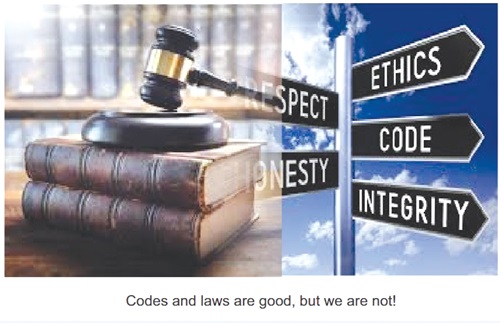A great dilemma troubles humanity.
As human beings, we must be ruled by laws, constitutions and codes of conduct.
Otherwise, we would be like beasts in the jungle where every animal does what it pleases and only the fittest survive.
But we, the people for whom rules and guidelines are enacted, are human beings with weaknesses and faults.
While the laws are good for us, we are so weakened by our flesh that we easily break them.
Sometimes, even while the ink used in writing the codes or rules is still wet, they are already being broken.
For example, while Moses was bringing down the Ten Commandments from Mount Sinai to God’s people, they were down there breaking the very first commandment!
Helpless lawbreakers
In truth, human beings are helpless lawbreakers.
That is why we have the penal system to enforce the laws through correctional facilities such as prisons.
This way, society is protected against crime.
Yet, our dilemma persists, for, despite the penal system that includes capital punishment, humanity continues to break laws.
The problem is not with the laws but with us.
While the laws are meant to guide us, we look for loopholes in the laws so we can break them with impunity.
Our frustration
Apostle Paul describes his frustration with human weakness in relation to the law: “I find it to be a law that when I want to do what is good, evil lies close at hand" (Romans 7:21).
In other words, while every law is meant to help us do what is right, it is weakened by human flesh that desires to do the wrong the law forbids.
The frustration is compounded when, sometimes, the lawmakers themselves fall foul of the very laws they enact.
As Paul realises that the good he wants to do he cannot do, but rather the evil he doesn’t want to do is what he does, he cries out, "O wretched man that I am! Who will deliver me from this body of death?" (Romans 7:24).
Biblical scholars explain Paul’s dilemma: “He is expressing the internal conflict he experiences between his desire to do good and the power of sin that still resides with him.”
Given our constant struggle against wrongdoing, we must all cry out, “O wretched people that we are! Who will deliver us from this body of death?”
Like Paul, our physical body is a source of enticement and evil attraction as we struggle against the law of God.
And we must not forget that all codes of conduct, laws and even moral aspects of constitutions are based on God’s law.
Who will deliver us?
What all this means in divine parlance is that by nature and by destiny, we are a people under God’s wrath. Due to sin, which is enhanced by human failure, we are naturally subject to God’s righteous anger and judgement.
Therefore, the wrath of God is revealed from heaven against us because of our evil" (Romans 1:18). This state of humanity automatically makes us enemies of God, to face condemnation.
As noted earlier, Paul’s lamentation is a deep question: “Who will deliver me from this body of death?” Who will deliver us from sin and weaknesses that point to death and destruction?
He provides the answer in 1 Corinthians 15:57—"Thanks be to God! He gives us the victory through our Lord Jesus Christ.” For God has demonstrated his love towards us by making his Son Jesus to take our punishment and set us free.
Great revelation
One of the greatest revelations of scripture about the weakness of laws and codes and their failure to regulate conduct is found in Romans 8:3— “What the law could not accomplish due to the weakness of the flesh, God accomplished by sending his own Son in the likeness of sinful flesh to condemn sin in the flesh.”
Clearly, the law, though good, could not accomplish its purpose—just as codes of conduct and rules are largely unable to accomplish their purposes, so that we break them with reckless abandon.
What was the law supposed to accomplish? The law was meant to draw us close to God, help us love God and obey him, and then strengthen our relationship with one another—all in preparation for our souls to spend eternity with him.
But the law failed to accomplish this because it was dependent on humanity’s flesh and blood, which could not accomplish God’s divine purpose.
The arm of flesh will always fail us.
Therefore, in an unprecedented demonstration of love and grace, God decided to do for us what the law could not do, by sending his own Son, the Lord Jesus, to save us!
Our role is to respond to God’s love and accept this marvellous grace that he extends to us.
The writer is a publisher, author, writer-trainer and CEO of Step Publishers.
E-mail: lawrence.darmani@gmail.com

